Aggregator
Gaza's mothers are going through hell
My little brother is missing
Zionist Instigators Storm Los Angeles Campus
by Ibrahim Moiz for MuslimMatters
May 2, 2024
UCLA Students and Faculty Horrified at Extent of ViolenceThe campaign against pro-Palestine protests on American campuses took another unsavory shift this week in Los Angeles when an encampment at the University of California Los Angeles (UCLA) was stormed by armed Zionist thugs, who set about attacking the protesters with practical impunity and with no response from either police or campus security. The assault continued for hours in the night, leaving both students and faculty horrified at the extent of the violence and its indulgence by security who are meant to protect the university community.
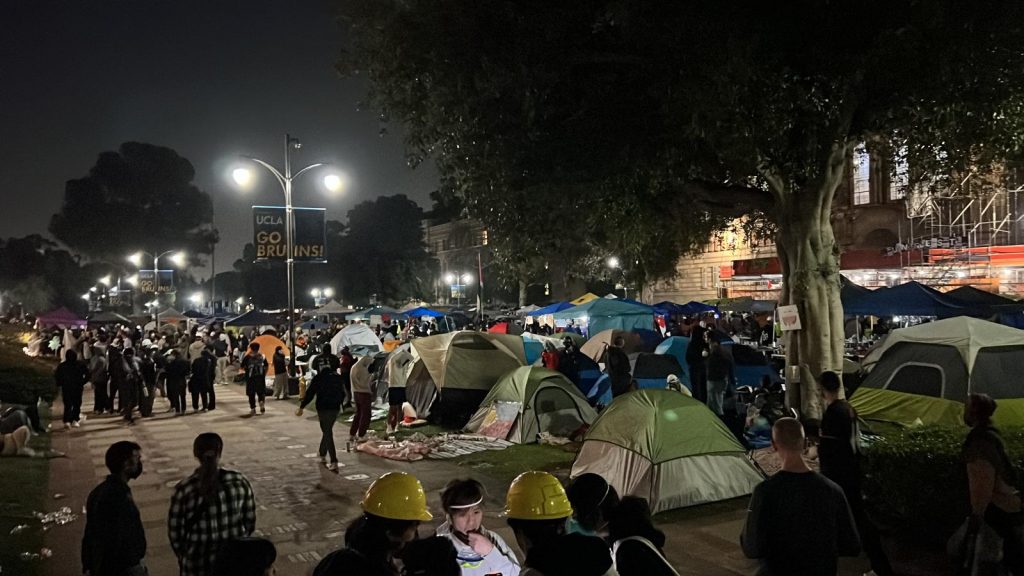
UCLA pro-Palestine encampment
Overwhelmingly nonviolent protests have spread across the United States in recent weeks, as students protest for universities to divest from companies that profit off the internationally illegal, but liberally indulged, occupation of the West Bank and Palestine. Although the United States has long claimed brokerage between Israelis and Palestinians, in actual fact, it has indulged Israel’s occupation under the pretext of security, and much of the American political and business class has engaged with and invested in an internationally illegal occupation.
Cowardly Leaders Fail to Protect Students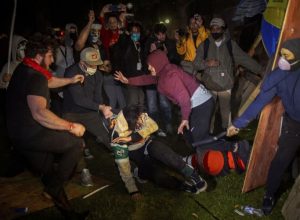
Pro-Israeli thugs attack protesters
In a typical diversion, Zionist organizations and their sympathizers in the corridors of power, as high as Joseph Biden himself, have attempted to paint the opposition to Israel’s genocide in Gaza as an episode of antisemitism, notwithstanding the hundreds of Jewish protesters and the mounting disapproval for Israeli policies among even a traditionally sympathetic Jewish-American populace. Thus the White House’s only response to events at New York’s Columbia University, whose British-Arab president Minouche Shafik caved into political pressure and ordered the police on her own students a fortnight ago and where students occupied a historic hall in solidarity with Palestine, was to condemn antisemitism and paint the Arabic term intifada, commonly used in various uprising-related contexts around the world, as an antisemitic slur.
At the other, western end of the United States, leadership has been similarly craven. In an interview with Ian Masters, professor and director of the UCLA Institute on Inequality and Democracy Ananya Roy described the university’s failure in protecting its students, whose “calm, contained, peaceful encampment” was repeatedly menaced by Zionist agitators. This failure, Roy says, led directly to the “unchecked violence”, dumbly watched by passive security forces as students and faculty who tried to protect them were assaulted. The administration, according to Roy, “resolutely refused to recognize the safety and well-being of our very own students who are in that encampment and really have the right to protest at university.”
Campus Administration Negligence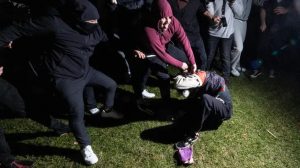
Pro-Zionist thugs attacked protesters
Not only did the university administration fail to have the attackers arrested, but their statements and messaging “downplayed the need for safety and well-being for the students in the encampment”. It was in this context that some two hundred Zionist thugs launched an armed night attack on the encampment, savagely laying about the students and chanting genocidal slogans such as the call for a second “Nakba”, referring to the original expulsion of Palestinians from their land at the foundation of the Israeli ethnostate in the late 1940s.
Though UCLA chancellor Gene Block has since responded to the assault with a condemnation, Roy describes the administration as having been negligent in the days leading up to it. Complaints about the behavior of a Zionist counterprotest over the weekend – a counterprotest funded in part by the wife of comedian Jerry Seinfeld – were ignored.
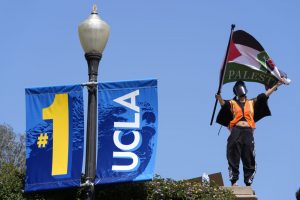 Belying widespread attempts to portray the protests as antisemitic because of their criticism of Israel, Roy noted that many of the students and, indeed, faculty who opposed Israel’s policy were Jews, who were nonetheless endangered by violence in the name of the “Jewish state”. She described how one Jewish student on whom she checked after the violence replied, “I’m okay – but the university was really trying to kill us last night.”
Belying widespread attempts to portray the protests as antisemitic because of their criticism of Israel, Roy noted that many of the students and, indeed, faculty who opposed Israel’s policy were Jews, who were nonetheless endangered by violence in the name of the “Jewish state”. She described how one Jewish student on whom she checked after the violence replied, “I’m okay – but the university was really trying to kill us last night.”
Many comments on social media expressed shock at the violence and its apparent impunity.
https://twitter.com/ryangrim/status/1785614477561344489
Others grimly noted the parallel with Zionist militia violence in Palestine, where thuggish Israeli settlers regularly brutalize Palestinians with the protection, and frequent participation, by the Israeli state.
https://twitter.com/BenEhrenreich/status/1785606983065739581
https://twitter.com/thaqafatalhind/status/1785642951697154131
Related:
– Callous Campus Crackdowns On Pro-Palestinian Protesters Grip The United States – MuslimMatters.org
We Are Not Numbers x MuslimMatters – Ramadan While Under Attack In Gaza
The post Zionist Instigators Storm Los Angeles Campus appeared first on MuslimMatters.org.
Tents turned into classrooms
News highlights for week 30 of Israel's genocide in Gaza
Israel’s threatened ground invasion into Rafah would be catastrophic, rights groups warn.
Quranic Verses For Steadfastness For The Valiant Protesters On Campus
We have all been watching the courage of America’s university students (and those from across the world) as they encamp in peaceful protest of Israel’s genocide against Gaza and demand from their institutions that they divest from their investments in that apartheid state.
We have also seen the hypocrisy of their institutions on full display -these supposed beacons of free speech, academic freedom, and intellectual dissent-, as they attempt to crush the peaceful protests…evicting them from student housing, suspending them, canceling their meal plans; and when all of that failed, responding with overwhelming force, and calling on local police to arrest the students that are entrusted to their care.
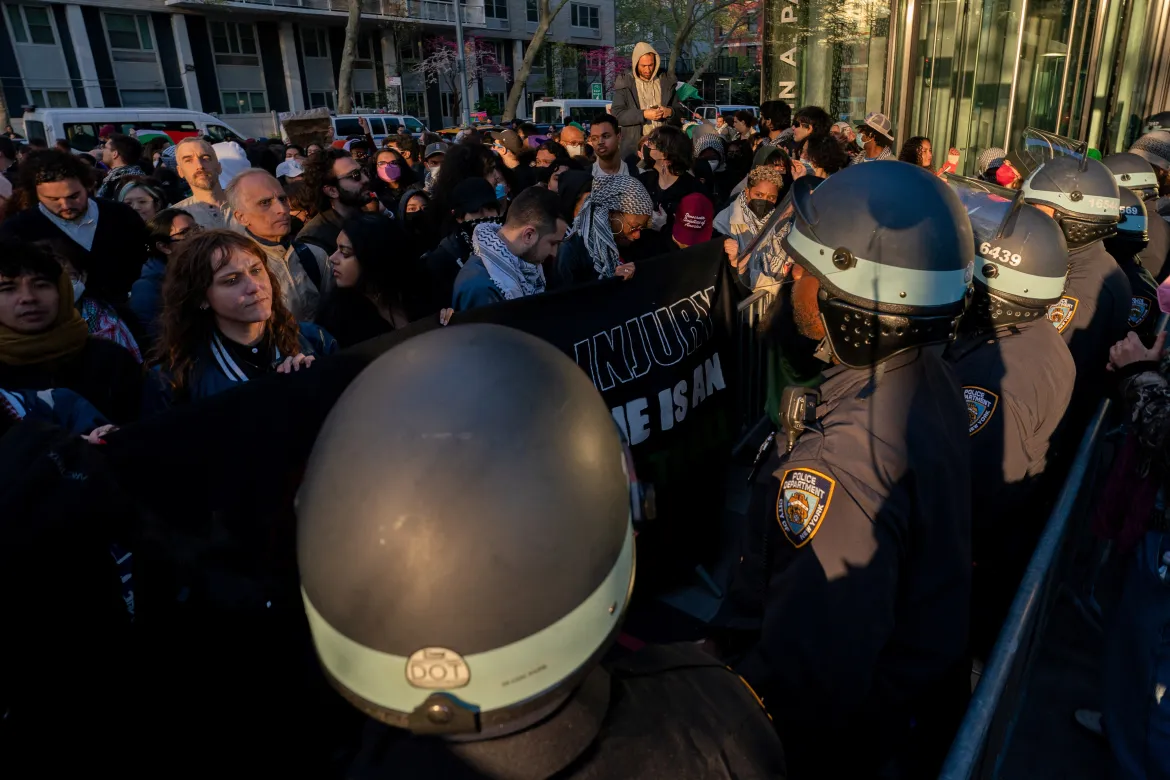
Students and pro-Palestinian supporters occupy a plaza at the New York University campus. [David Dee Delgado/Reuters]
The scenes that we have witnessed will mar the image of these institutions for a long time: snipers on the roofs of Ohio State University, professors being thrown on the ground and viciously arrested at Emory University in Atlanta, and students praying in handcuffs at the University of Southern California.And yet these students persist, and the encampments continue to grow.
I would say that we are proud of them, but it is much more than that…we are inspired by them and also aspire to be like them.
They are the ones leading, and we support them however we can.
In this spirit, I want to share that our Prophet ﷺ said, “Know that victory comes with sabr.”
Sabr is a word that is generally translated as patience, but it is much bigger than patience; it is resilience, perseverance, persistence, fortitude, steadfastness, grit, consistency, and discipline – among other things.
And this is a moment in history that requires sabr and steadfastness.
Our greatest source of inspiration and guidance is the Quran, and when we look through its verses we find incentives for steadfastness andmresilience of which here I will share five.
-
Asking Allah
 for steadfastness
for steadfastness
And Allah  informs the Prophet Muhammad ﷺ that,
informs the Prophet Muhammad ﷺ that,
“And had We not made you stand firm, you would nearly have inclined to them a little.” [Surat Al-Isra: 17;74

When Allah  sent Moses
sent Moses  and Aaron
and Aaron  to Pharoah they were commanded,
to Pharoah they were commanded,
“Go, you and your brother with My signs and do not slacken in My remembrance.” [Surat Taha: 20;42]
The remembrance of Allah  strengthens the spirit and the body, and it was this regimen that Allah
strengthens the spirit and the body, and it was this regimen that Allah  instructed Moses
instructed Moses  and Aaron
and Aaron  to keep as they faced one of history’s greatest tyrants.
to keep as they faced one of history’s greatest tyrants.

“And they said nothing but: ‘Our Lord! Forgive us our sins and our transgressions (in keeping our duties to You), establish our feet firmly, and give us victory over the disbelieving people.'” [Surat Al-Imran: 3;147]
There is nothing that causes defeat more than sins, and so those seeking victory should tirelessly and constantly ask Allah  to forgive them. They recognize that in the end victory comes from Allah
to forgive them. They recognize that in the end victory comes from Allah  ; the most important factor to secure then, is the support of Allah
; the most important factor to secure then, is the support of Allah  , and they do that by keeping their duties to Him
, and they do that by keeping their duties to Him  and avoiding sins.
and avoiding sins.

“Say, [O Muhammad], ‘The Holy Spirit has brought it down from your Lord in truth to make firm those who believe and as guidance and good tidings to the Muslims.'” [Surat Al-Nahl: 16;102]
“And each [story] We relate to you from the news of the messengers is that by which We make firm your heart. And there has come to you, in this, the truth and an instruction and a reminder for the believers.” [Surat Hud: 11;120]
Allah  says that He
says that He  related the stories of the Prophets to give the Prophet Muhammad’s ﷺ heart resolve. And when you read and reflect on the stories of the Prophets it also grants your heart resolve, so that you know that when you stand for truth you are standing in a long line of Prophets and believers who were tested before you; who stood their ground before you, and that the truth ultimately wins. The truth will come and falsehood will perish, falsehood is bound to perish.
related the stories of the Prophets to give the Prophet Muhammad’s ﷺ heart resolve. And when you read and reflect on the stories of the Prophets it also grants your heart resolve, so that you know that when you stand for truth you are standing in a long line of Prophets and believers who were tested before you; who stood their ground before you, and that the truth ultimately wins. The truth will come and falsehood will perish, falsehood is bound to perish.


“O you who have believed, if you support Allah , He will support you and plant firmly your feet.” [Surat Muhammad: 47;7]
Ibn Kathir in his commentary of this verse quotes a hadith that is controversial in its authenticity in which the Prophet ﷺ says,
“مَنْ بَلَّغ ذَا سُلْطَانٍ حَاجَةَ مَنْ لَا يَسْتَطِيعُ إِبْلَاغَهَا، ثَبَّتَ اللَّهُ قَدَمَهُ عَلَى الصِّرَاطِ يَوْمَ الْقِيَامَةِ”
“Whoever communicates to an authority the need of someone who is not able to communicate it, Allah  will make their feet firm on the sirat (bridge over the hellfire) on the Day of Judgment.”
will make their feet firm on the sirat (bridge over the hellfire) on the Day of Judgment.”
And that is exactly what these students are doing: communicating to their universities, and the world, on behalf of the children of Gaza that their complicity and maintenance of the status quo as a genocide is unfolding is unacceptable.
May Allah  make their feet firm, and may He
make their feet firm, and may He  grant them victory.
grant them victory.
Related:
– Callous Campus Crackdowns on Pro-Palestinian Protesters Grip the United States – MuslimMatters.org
– Protests: An Islamic Perspective – MuslimMatters.org
The post Quranic Verses For Steadfastness For The Valiant Protesters On Campus appeared first on MuslimMatters.org.
Callous Campus Crackdowns On Pro-Palestinian Protesters Grip The United States
May 1, 2024
Scenes of a Police State
In scenes more reminiscent of a flailing police state than anything else, several major university campuses across the United States of America have witnessed crackdowns against non-violent pro-Palestine protest encampments. In the northeast, New York’s Columbia and City Universities have both seen police crackdowns against both students and faculty protesting links to Israel. On the West Coast, meanwhile, police stood by to watch as hundreds of pro-Israel thugs attacked student protesters at Los Angeles’ University of California.
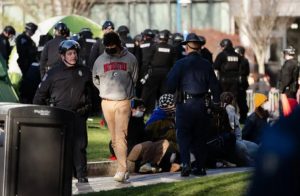
Hundreds of campus protesters have been arrested
The crackdowns follow weeks of peaceful, and surprisingly disciplined protests against both the United States’ general support for, and the universities’ specific links to, the Israeli ethnostate that has killed tens of thousands of Palestinians, over half of them children, in a brutal and ongoing campaign for the last seven months.
Dispelling with a long-professed but always wafer-thin pretense of neutrality between Israel and the Palestinians, the American government – led by liberal Democrat Joseph Biden, whose Zionism is rabid even by the standards of American politicians – has thrown its full weight behind Israel. This includes financial support to the tune of billions of dollars, including a package pushed through in mid-April 2024 by the fanatical far-right Congressional speaker Mike Johnson, as well as indispensable military support and diplomatic cover. This happened even as the war sours on an American public that has historically been far more indulgent toward Zionism than the overwhelming majority of the planet.
Attempts to Reframe Opposition to Genocide as AntisemitismBecause Israel is a Jewish ethnostate, one of its defenders’ fondest strategies has been to present any criticism as being an essential hatred of Jews. Thus, antisemitism, and not the generation-long blockade of the Gaza Strip, was widely portrayed as being the cause for the October 2023 hostage raid by Palestinian militants that paved the way for the genocidal Israeli onslaught.
In the United States, Zionist organizations have openly advertised for provocateurs, especially such as can pass as Arabs, to infiltrate and break up the protests. Their aim has been to spread a false narrative, widely parroted in much of the mainstream media, that the protests are about intimidating Jews – even as hundreds of Jewish protesters oppose Israel’s genocidal violence done in their name and the Israeli state loses support among American Jews.
Zionist dissemblers ranging from manchild professor, arms industry profiteer, and widely alleged student-harasser Shai Davidai to serial bellyacher Sahar Tartak have leapt snout-first into the trough, yowling on international platforms about alleged attacks clearly belied by camera evidence and calling in paramilitary crackdowns after fearmongering about something as simple and fundamental as Muslim students in prayer. As with the enormously destructive war on terror that ravaged the Muslim world – a war that was encouraged, and whose patterns are fully embraced, by Israel – Zionist tactics revert at a pinch to the lowest common denominator.
Familiar Authoritarian Tactics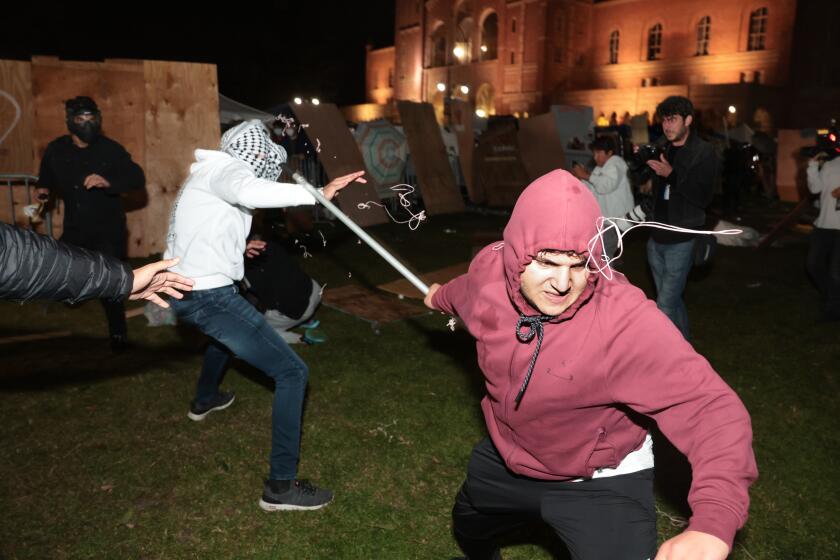
Zionist thugs attack pro-Palestinian protesters at UCLA
These are, of course, tactics widely practiced by Israelis on Palestinians, but the close link between Israeli enforcement and their American counterparts may at least partly explain why they have caught on in the United States. The sight of Zionist thugs storming pro-Palestine protesters in Los Angeles while the police looked fondly on is eerily similar to what is routinely done by ethnonationalist ‘settlers’, fully enabled by Israeli institutions, against Palestinians.
Not that provocateurs are solely to blame. In mid-April 2024, for example, a congressional upbraiding persuaded Columbia president Minouche Shafik, an Alexandrian-born British aristocrat, to call the police on her students. The parallels with Arab autocrats from Anwar Sadat to Mohammad bin Zayed who have repressed their populations in order to indulge Israel is too obvious.
There is also historical precedence in the student occupation of the famed Hamilton Hall in 1968. At the peak of the Vietnam War, students occupied the hall and renamed it after Malcolm Shabazz “X”, the visionary revolutionary. During anti-apartheid protests in 1985, the hall was occupied and named after Nelson Mandela, the then-imprisoned and blacklisted South African opposition leader who would go on to end apartheid five years later.
In the current protest, the protesters that seized the hall chose to name it “Hind’s Hall”, after Hind Rajab, the six-year-old Palestinian child whose family and would-be rescuers were killed and who was pointedly left to die in a particularly callous example of the Israeli army’s brutality.
From Biden to Musk to Amy SchumerPoliticians and most media have also played their part. This reaches as high as Biden; unsatisfied with repeatedly humiliating himself by parroting Israeli lies over Gaza in the autumn, he has stepped up to redefine Arabic words such as intifada, a common phrase often but not exclusively used in the Palestinian context, as hate speech.
The government has recently announced that the jurisdiction of the International Criminal Court does not for some reason extend to Israel. In addition, of course, it has repeatedly barred opposition to Israel at international forums and has cheerfully indulged Israel’s vilification of aid workers and mass slaughter of United Nations staff.
In the private sphere, degenerate moguls from Elon Musk to Bill Ackman have rushed to cover for Israel, while celebrities such as Amy Schumer have only been rewarded for dog-whistling bigotry, their base lies reimagined as boldly told truths.
The remarkable variety of Zionist indecency, and the extent to which they are willing to go, are certainly dispiriting for anybody with a brain and conscience. But it is precisely why the fight to cut support for Israel is so necessary, no less within the United States than without.
Related:
Podcast: Gaza’s Strength, Our Weakness | Shaykha Zaynab Ansari
The post Callous Campus Crackdowns On Pro-Palestinian Protesters Grip The United States appeared first on MuslimMatters.org.
The physics of death in Gaza
Day 208 roundtable: Debunking new 7 October "mass rapes" hoax; Israel insists on Rafah invasion
News report with Nora Barrows-Friedman (01:44); Ali Abunimah debunks new “mass rapes” hoax (25:19); Journalist and teacher Donya Abu Sitta reports from Gaza (01:26:10); Jon Elmer analyzes latest resistance videos from Gaza, Lebanon and Yemen (01:40:46); Group discussion on Rafah and US campuses (02:24:18).
Uprooted again and again
My grandfather built our home, now it is rubble
World Court rejects ban on German weapons exports to Israel
Judges decline Berlin’s request to dismiss complaint made by Nicaragua.
Heatwave amid a genocide
US implicated as Israeli impunity nears its end
Netanyahu government spreads rumors of imminent arrest warrants.
Escaping death but losing everything
Smears must not deter students from acting against genocide
Pro-Israel group portrays protests as anti-Semitic.
Yemeni Islah Leader Abdul-Majeed Zindani Passes Away
by Ibrahim Moiz for MuslimMatters
28 April 2024
Major Political and Da’wah Figure One of Yemen’s most colourful politicians, and a major figure in Islamic proselytization, passed away this week. Abdul-Majeed Zindani was a founding leader of the Islamist Islah party, a major part of Yemeni political and public life for the last thirty years, and was energetically involved in Yemeni and regional politics and education since the 1960s, when the country first became a republic.
One of Yemen’s most colourful politicians, and a major figure in Islamic proselytization, passed away this week. Abdul-Majeed Zindani was a founding leader of the Islamist Islah party, a major part of Yemeni political and public life for the last thirty years, and was energetically involved in Yemeni and regional politics and education since the 1960s, when the country first became a republic.
In effective exile in Turkiye when he passed away in his early eighties, Abdul-Majeed Aziz Hammoud Zindani was a long way from home. Born in central Yemen’s Ibb province into the Arhab clan, Zindani studied across Yemen before joining the still relatively small coterie of students who travelled abroad, a coterie that had a major impact in Yemeni politics during the period.
Regional WarsAt the time, North Yemen was ruled by an increasingly unpopular Zaidi imamate, while South Yemen was ruled by Britain from the port city of Aden. During Zindani’s youth in the 1960s, the situation changed dramatically: in 1962 a military coup in Sanaa, widely supported by North Yemen’s educated class and dissident clans, toppled the imamate, while nationalist and leftist militants in South Yemen agitated against and eventually ousted the British colony. North Yemen in particular became the focus of a regional war: Cairo sent a major military expedition to support the Sanaa regime, while Saudi Arabia and Jordan, backed by Britain and the United States, threw their support behind an insurgency built around Zaidi supporters of the former imamate. It was to be the first of several regional wars in Yemen in Zindani’s lifetime.
Moving in Conservative CirclesAt that point, Zindani was studying in Cairo, where he came into Islamist circles led by Muhammad Zubairi, who was later assassinated after attempting to mediate in the civil war, and the underground Ikhwanul-Muslimin group. The latter association forced his deportation to Yemen, where, still in his mid-twenties, he was promoted to the information ministry.
With the end of the North Yemen war, Saudi Arabia withdrew its support for the imamate insurgency and instead cultivated conservative circles in the Sanaa government in the 1970s. Zindani was one such figure and eventually moved to teach in Saudi Arabia, beginning a long if often uneasy association with Riyadh that would last four decades.
Zindani was closely associated at this point with the Muslim World League, a Saudi-sponsored association that collected various Islamic scholars and activists from across the world for various educational and political endeavours. With a lifelong interest in science, he founded the World League’s commission to examine scientific miracles in the Quran and Sunnah in the mid-1980s.
Contact With Jihadists and Founding of IslahZindani also ardently supported – in the name of jihad – the 1980s Afghanistan resistance against the Soviet invasion, raising volunteers and travelling for the cause. In the event, he also made contact with famous Arab leaders in that insurgency, including the Palestinian preacher Abdullah Azzam and the then-Saudi-backed potentate Usama bin-Ladin.
Yemen during the 1970s and 1980s was preoccupied with questions of unification between North Yemen and South Yemen, and the specific terms of such unification. South Yemen, under a Marxist regime since 1969, backed leftist dissidents in the North, while North Yemen backed various often conservative dissidents in the South: often these dissidents mounted small-scale insurgencies.
When the two Yemens united under Northern dictator Ali Saleh’s leadership in 1990, Zindani worked to undercut leftist influence. He founded the Islah Party, along with the northern Hashid confederation chieftain and assembly speaker Abdullah Ahmar, in 1990. This was a mixture of Ikhwan-leaning Islamists, Salafis, and clansmen: Zindani qualified in each category. It became a major partner to Saleh’s ruling party, with Zindani promoted to the five-man ruling council in 1993.
By 1994 unhappiness with Saleh was mounting among various southern politicians, both the leftists and their former rivals, prompting them to break away and attempt to secede. The resultant war showed the limits of accord between Saudi Arabia and Islah. Riyadh, which had fallen out with Saleh, backed the separatists, but Zindani and Ahmar fiercely opposed them and framed the war as a jihad, for which they recruited both Islamist militants and clan fighters. It was only after the civil war that his relations with the Saudis were repaired.
Designated As a Terrorist A decade later, the American “war on terrorism” – with Zindani’s former friend Usama bin-Ladin as its primary target – put the Islah leader in its gunsights. The USA designated Zindani as a supporter of terrorism, and warned Qatar and Saudi Arabia to cut funds to his institutions. Zindani’s protests and offers to appear in court were supported by Saleh, who instead turned on another target of the United States, the Zaidi Houthi group in the north.
A decade later, the American “war on terrorism” – with Zindani’s former friend Usama bin-Ladin as its primary target – put the Islah leader in its gunsights. The USA designated Zindani as a supporter of terrorism, and warned Qatar and Saudi Arabia to cut funds to his institutions. Zindani’s protests and offers to appear in court were supported by Saleh, who instead turned on another target of the United States, the Zaidi Houthi group in the north.
Advocating a return to the imamate, the Houthis also attacked Saleh’s overtures to Washington and were soon embroiled in a war where Islah played a major role: the Ahmar family and Saleh’s cavalry corps commander Ali Muhsin, also affiliated with the party, led the campaign against the Zaidi rebels, in a faint repeat of the 1960s North Yemen war. As the war dragged on, Saleh’s alliance with Islah was increasingly frayed.
Switched SidesIn 2011, Saleh sent Zindani to mediate with protesters in Sanaa, part of a regional pattern of opposition to Arab dictators. Instead Zindani sided with the opposition, part of a general Islah pattern of turning against the dictator. The resultant government, led by Saleh’s former deputy Abdrabbuh Hadi, featured a significant Islah presence. This prompted Saleh to secretly side with the Houthis against the coalition between Hadi and Islah. In September 2014 Zindani had to flee Sanaa as the Houthis mounted a sudden takeover of the capital.
With the regional tables again turning, in 2015 Saudi Arabia and the United Arab Emirates led a bloody campaign in Yemen, ostensibly to support the ousted government of which Zindani’s Islah party was a part. Even as it officially opposed the Houthis, Abu Dhabi also supported southern separatists and turned on Islah, which still maintained passable links with Saudi Arabia. Zindani uncompromisingly opposed the separatists once more. Like Hadi, he lived in Saudi Arabia until 2020, when he moved to Turkiye. There he ended his life, far from a homeland in whose history he had played a major part for decades.
Related8 Signs of Extremists According to the Prophet ﷺ | Yahya Ibrahim
The post Yemeni Islah Leader Abdul-Majeed Zindani Passes Away appeared first on MuslimMatters.org.
Bismillah, The Beast [Part I] – A Short Story
The Prophet ﷺ said, “A woman is married for four things: her wealth, her family status, her beauty and her religion. So you should marry the religious woman, otherwise, you will lose out.” [Sahih al-Bukhari 5090]
Once upon a time in the Land of the Sunset, a merchant named Aderfi Yaqoob lived with his six children. Being a man of the market, he had high hopes that not only would his children be merchants like him, but sultans of more than souks.
Shortly after his eldest son became old enough to hold a saw, he soon joined Souk Chouari and its carpenters. When his middle son could first hold a hammer, he rushed to be an apprentice of one of Souk Haddadine’s blacksmiths. And his youngest son, cloth in hand, was welcomed eagerly by the cobblers of Souk Smata. All three brothers began to spend longer and longer hours in their respective markets, neglecting their aging father at home, adamant that such time in the souks would be invested into their father’s security later.
Aderfi also had daughters, but they had little interest in working in the markets. Instead, they loved spending money in those markets. After their mother passed, Aderfi tried to console his eldest daughter with jewelry from Souk Dhabia and his middle daughter with perfume from Souk Attarine.
But the youngest was peculiar; she never asked for anything the way her two older sisters did. It was her father’s company that was invaluable to her, and not what he could purchase. Known for the beauty of her character and appearance, it was no surprise that she was a lady of her name: “Jameela.”
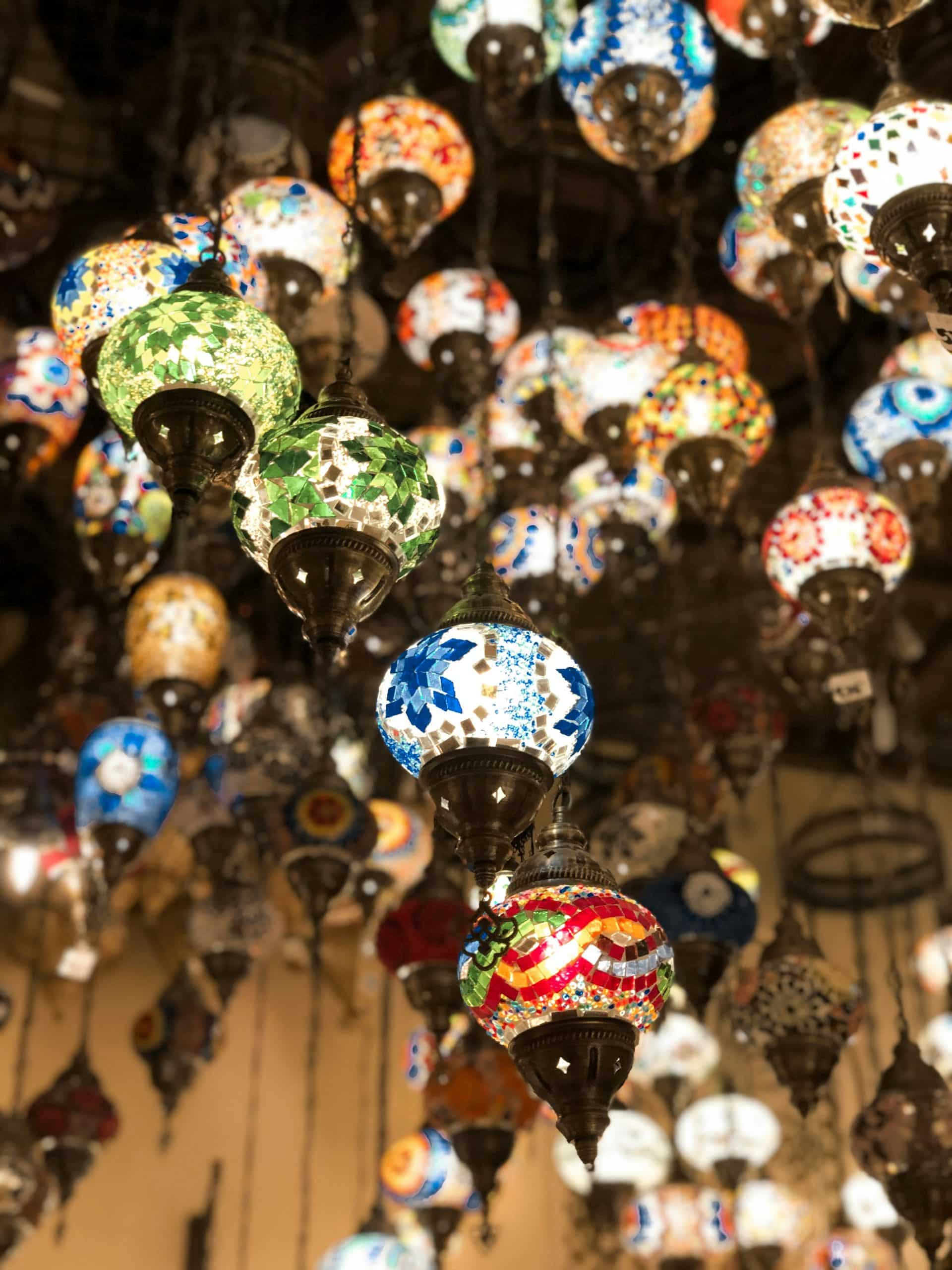
Lanterns of the souks [PC: Dario Ciraulo (unsplash)]
The brothers soon became successful in their crafts. Many of the women in Marrakech whispered to their fathers about Aderfi’s sons, seeking them out for their promising careers and amassing wealth. For them to be married to merchants, too, would have boosted their reputations.His daughters also received numerous marriage proposals— but for many of the same reasons. Bachelors saw the ladies as beautiful, wealthy, and related to the greatest merchant in Maghreb. Sadly, none of the men saw those ladies for their virtue. Jameela, of course, received the most proposals of all. However, she also declined the proposals more than her sisters did. With her older siblings seemingly ready to be married at any minute, Jameela instead chose to stay at home with her father for a few years more.
An Angel is NearThen tragedy struck. Foreign soldiers took over the souks. The leather meant for Souk Cherratin was taken and adorned by the soldiers, and the carpets for Souk Zrabi laced their homes instead of those of the Amazigh. Dyes from Souk Sebbagine spilled the streets until the people surrendered.
With nothing but the clothes on their backs, Aderfi and his children fled to their country home far away from the markets. Both sets of sons and daughters lost their suitors and brides-to-be. The father became a shepherd instead of a seller, and his children chose labor in light of losing love.
They all had to remain awake before the sun rose. The men were used to a quick nap after fajr, waiting until the other people awoke to purchase their wares. But now they dragged themselves from their warm beds to herd animals, tend to the earth, and hunt predators away. The women stayed inside the home, making butter from the milk, retrieving eggs from the chickens, and feeding the animals. It was a hard life, and they all complained about it… save for Jameela. Instead of groaning like her brothers and moaning like her sisters, she recited salawat as she worked, and beamed at the cry of every rooster.
“An angel is near!” she said happily each time.
Aderfi nodded, and responded, “There is, indeed.”
A year passed. One day, Aderfi received a letter from a fellow merchant. The letter detailed that the soldiers had relaxed their regulations. Many of them had shipped goods home to their families, and wanted more. And the only one who could navigate the paths of each souk was none other than Aderfi.
He wept for joy, and proclaimed “Alhamdulillah!” His sons would have jobs again! His daughters would not suffer from breaking cookware and old clothes! All right before Ramadan. What a blessing!
Wiping away his tears, he asked his children what they wanted when he returned. His daughters answered almost immediately—a new pot from Souk Fekharine, and a copper kettle from Souk Seffarine. The brothers, staying back to protect their sisters, asked their father for similar things as gifts to their former fiances, hoping they could be convinced to return.
When it was Jameela’s turn, she, too, had to pause to rub her eyes. “Jazakum Allahu khayran,” she said. As usual, there was nothing she really wanted, other than her father’s safe return. But she looked at her siblings, who seemed ready to tease her if she refused. “If it was one thing I could never find in the souk, it was a desert rose.”
Aderfi obliged. In Marrakech, he was welcomed as an honored man by the locals. “Ramadan Mubarak!” they told him. Souk Nejjarine was full of beautiful wooden decorations, and Souk Semmarine was full of Eid gifts.
However, he quickly discovered that most of his merchant friends had also fled in fear. All of his sons’ former employers were gone, and it took Aderfi hours to convince the new sellers for a position for each one of them again. The pay was much less after occupation, as well. But Aderfi knew his sons, and they would prefer it to farm work any day.
But just as the pay was less, the prices were higher. Aderfi struggled to work out deals with the new sellers—some of them even soldiers’ wives. Scared of being accused of causing trouble, he retreated with only two gifts for his daughters.
For the second time, he left Marrakech defeated. His heart was so heavy, and his thoughts so preoccupied, that he rode through the desert without looking about him. Soon enough, he became lost. His horse, too, was unable to find his way. Terror began to consume him. He might not make it home in time for Ramadan.
The winds whipped and sand swept into his eyes, and the sun continued to sink. When it was time to pray Maghrib, he sank into sajdah, begging Allah  for a way out.
for a way out.
Just when he thought there was no way for him to return home, he stumbled upon a beautiful oasis. Date palms encircled a beautiful white veranda. Bushes of jasmine and plentiful trees of tangerines seemed to open their arms towards him.
Dar al-Bayda? he wondered as he crept closer. Casablanca? No, it couldn’t be. As he led his horse to a nearby pond, he kept looking around himself in disbelief. Not a soul was present. But he knew someone had to live here, otherwise, this place wouldn’t be as well-maintained as it was.
“As-salamu alaykum!” he called as he entered the ornate veranda. No one responded. Yet everything was meticulously decorated and immaculately clean. The floors were made of tile and lofty pillars held up an intricately designed roof. A creeping sense of worry began to fill Aderfi’s mind. By all appearances, he might have stepped into a foreign soldier’s abode, and he could be arrested for trespassing.

An ornate oasis [PC: Mert Kahveci (unsplash)]
But a warm fire was lit up ahead, and the desert cold was unforgiving outside. He thought to sit and wait to explain himself. He cleared his throat again, and took a few more moments to compose himself by the fire. Perhaps his host was praying.“I only mean to stay until ‘Isha. And then, I will set up camp outside,” he said aloud. Nothing but the empty air responded to him. Aderfi continued to look around at his surroundings. He was in the salon, and doubtless, there might be staff preparing for dinner. When he peered into the next room, indeed, he found a spread of food already laid out. A tajine with fresh chicken, apricots, and plums, bathed in turmeric and other spices. There were other delights around it; couscous with raisins, red onions, red bell peppers, fish chermoula, b’sarra soup, and a flaky b’stilla pastry. His mouth watered, but he returned back to the salon.
“Might I join you for your meal?” he asked aloud to his unseen host. “And then take rest for the remainder of the night? I only wish to wait until Fajr, and then I will be out of your way.”
‘Isha came, announced by a clock loitering on the wall. After he prayed, Aderfi couldn’t restrain himself, and ate to his heart’s content. The master of the house never came to join him. He promised to recompense him, and went into the nearby room—clearly made up for a guest. Covers softer than his bed in Marrakech, with thread woven by only the most skilled weaver.
Aderfi marveled at the sight. It was almost as though the master was waiting for him. A fresh djellaba and warm bathwater was prepared for him. Perhaps it was an angel? He thanked Allah  profusely as he drifted off.
profusely as he drifted off.
When he awoke for fajr, Aderfi could still hardly believe his eyes. His clothes from the previous night, now clean, had been laid out on the dresser for him, and there was fresh water for him once more. He made wudhu and prayed that the master would have everything his heart desired for his kindness.
Breakfast was light, but still wonderful nonetheless. Freshly picked mint tea and baghrir pancakes, with honey, cheese, and jam to go with it.
“I wish that you would join me, kind seedee,” Aderfi said before he ate. “We are brothers; it is only appropriate that we eat together.”
No response, still. Aderfi decided to pinch himself, and—no—still not a dream. Wanting not to trouble the kind master anymore, he tidied after himself as much as possible, and went outside. His horse was still waiting at the pond, although it was clear someone had gone to care for him. He was chewing on hay and appeared freshly groomed. Sadness consumed him. A merchant being unable to pay a master; truly, there was no humiliation like this.
Just as he turned to leave, he spotted something beautiful in the garden—bushes of desert roses. They had been masked only by the other flowers. Aderfi immediately remembered his promise to Jameela, and hurriedly rushed to pick one.
A terrible roar filled the air.
The ExchangeAderfi felt his heart leap into his chest. Bounding towards him was a great werehyena, eyes glowing with fury. As the merchant stumbled back onto his legs, screaming in fear, he saw that the werehyena wore a torn cape.
The master of the house.
“Ya Seedee—!” Aderfi cried.
The werehyena scoffed. An ugly sound; his black nostril flared and his garish teeth pulled back to show crimson gums. “I am no teacher. But you—” he said, leaning in closer, “are a thief!”
“Please,” he whimpered, “In Marrakech, I was the most famed merchant—”
“Then you would know how terrible of a thing it is to take from others!” The werehyena pulled back, snarling, his eyes two pupils of red fury. “A merchant who steals. Ha! And I thought I had experienced everything there was in this world.”
“Seedee, I swear by Allah—”
“Enough of your lies and smooth talk! I know what you think of me. Foolish merchant, you flatter your customers in the hopes that they are generous to you. Call me how you see me. A beast. Now beg, and with sincerity this time.”
“I only thought of giving this to my daughter, not myself! If I could give back all of your kindness in exchange for this one rose, I would do so. You have been so merciful to me—”
“Indeed, I regret it.” The werehyena stood on its hind legs, towering above Aderfi, searching his eyes for any sort of sincerity. “Well, it should only be fair, then, that you should live to see her enjoy it—along with other roses, yes?”
Aderfi, dumbfounded, nodded.
“Bring her to me. That is your exchange.” Then the werehyena snorted. “And I swear by Allah… I can track down any scent. Should you disagree with our deal, our bargain will be replaced with you instead.” Another snort. “Take this compass with you, with your daughter’s name in your heart, and it will show you where she is.”
Horrified, Aderfi glanced at the compass. It began to adjust its true north and pointed in the direction of his home. He rode filled with dread, knowing that his return to safety would mean her doomed captivity.
It was ironic, then, to have his sons welcome him with great hugs and his daughters with kisses. With trepidation, he announced to the sons of their new positions of work under occupation. They groaned, but said alhamdulillah for the improvement of their fortune. Aderfi’s daughters responded in an opposite manner, enthusiastic at the sight of their gifts, and forgetting their father.
For Jameela, though, it was as though she had received a chest of gold. “Ma sha Allah,” she said in awe at the desert rose. She pressed it to her nose and inhaled deeply. “It’s beautiful. Jazak Allahu Khayran, Baba!”
At the sight of his beautiful daughter enjoying freedom for the last time, Aderfi burst into tears. “Ya binti,” he wept. “This was the most expensive gift of them all.” He then told his children everything that had happened on the mysterious veranda. His daughters could hardly believe him, but, ready to get rid of their sister (whom they had never been very fond of to begin with), cried crocodile tears. The brothers, in similar disbelief, thought their father was merely showing signs of age. Jameela, though, was quiet and contemplative.
“Alhamdulillah,” she said. “Our father found a way out from his predicament, and I am able to go in his stead. He can spend Ramadan in his home and not in captivity. Baba, let us go quickly. We should not fast from food while being unable to keep our promises to others.”
“Don’t leave!” her sisters wept, the corners of their mouths twitching with hypocrisy. “Our precious, beloved sister!”
“Yes, Baba, let us go with you!” His sons urged. “We shall slay that beast!”
“No,” Aderfi asserted. “You must stay and watch your sisters—”
“And I will stay by your side. I will follow you whenever you leave.” Jameela left immediately to pack her things and those of her father’s. He knelt quietly at his majlis, too stricken to speak.
Aderfi didn’t sleep well that night, but there was nothing that could be done by the time the sun rose. He and Jameela set off towards the veranda, with fear of the beast in their hearts. Their only comfort was the hilal that shone above them, marking the first night of Ramadan.
Upon their arrival, the veranda was empty. Aderfi thought, at first, that the beast had died. But as he wandered through the salon, the guest room, and the dining room, he found that it was all as he had encountered before. As though the house were being prepared for someone to visit.
“Ya Seedee,” he called out. “I have brought my daughter as part of our agreement. Have mercy on her and show her the same kindness you showed me. I beg of you.”
From the darkness of the room, the werehyena responded. “I have eyes, thieving merchant. Go, enjoy your meal with your daughter. It will be your last.”
The two of them ate quietly at another marvelous spread for dinner, though neither had much of an appetite. Both retired, and Jameela found that her room had been elaborately adorned. Not a single wall was uncovered; there were bookshelves filled from ceiling to floor and the most exquisite Arabic calligraphy she had ever seen. Finely-crafted lanterns were scattered all around.
The bed was the most comfortable she had ever slept in. Jameela dreamt that she was crowned the sultana of Al-Maghreb. At suhur, she told her father her dream. He succumbed to emotion; it was what he always wanted for his children.
At last, the time came for her to bid farewell to her father. Both of them cried; she on her father’s chest and him on her shoulder.
“It’s not too late for me to stay in your stead, Jameela,” he whispered. “Let this Ramadan be my last. You have many more to look forward to.”
But Jameela shook her head and fought back more tears. He rode back out in the desert, and when Jameela turned around again, she found the werehyena just a few inches away.
“Bismillah,” she exclaimed. “The beast!”
***
[to be continued…]
Related:
– Asha and the Washerwoman’s Baby: A Short Story
The post Bismillah, The Beast [Part I] – A Short Story appeared first on MuslimMatters.org.
‘The hot topic is the war’: West Yorkshire’s Muslim voters feel politically homeless
Kirklees residents are likely to punish both the Tories and Labour for their stance on Gaza in the 2 May local elections
Of all the issues being discussed and debated among voters in the lead-up to local elections, there is one that has taken precedence for some residents of the West Yorkshire borough of Kirklees: the conflict in Gaza.
This week’s votes are predicted to bring damaging results for Rishi Sunak – whose personal ratings have reached a record low.
Continue reading...
